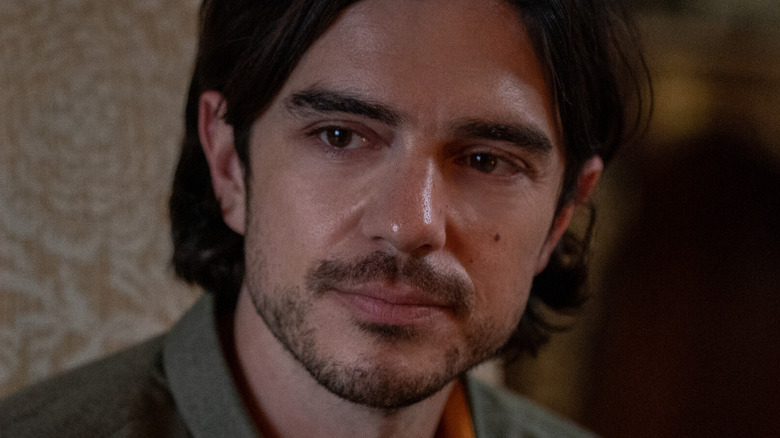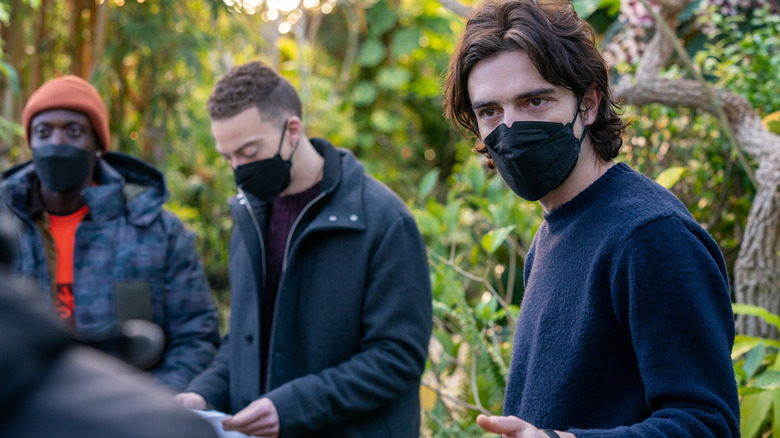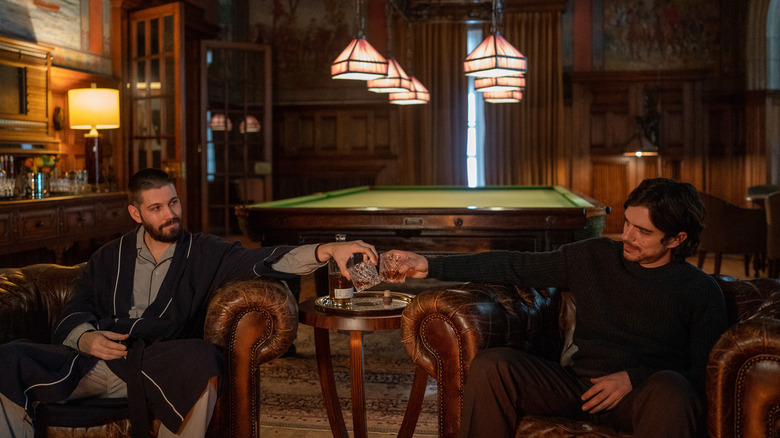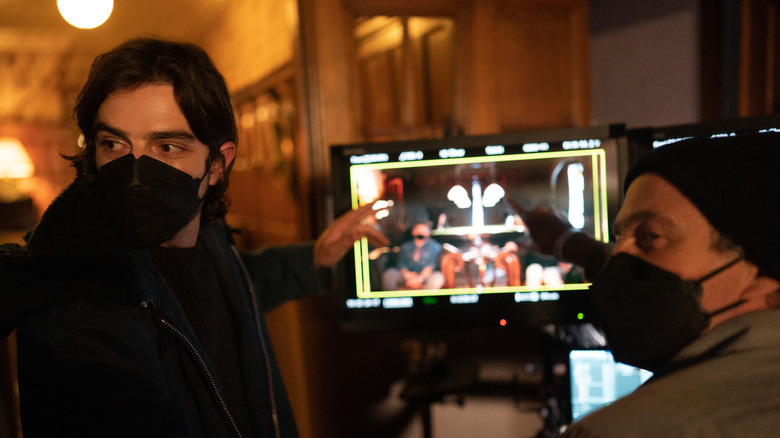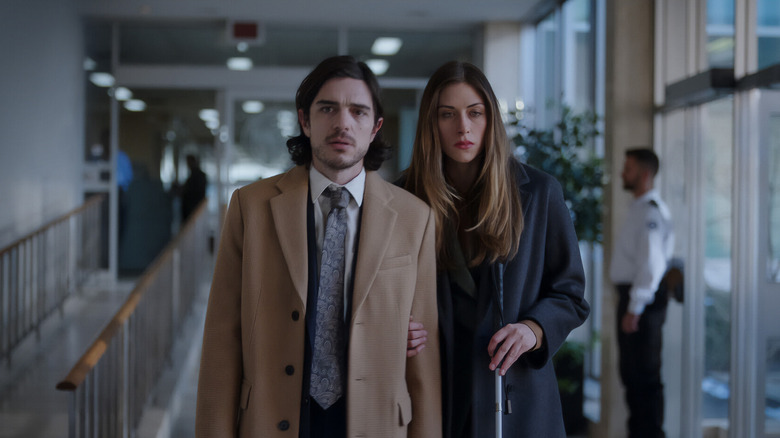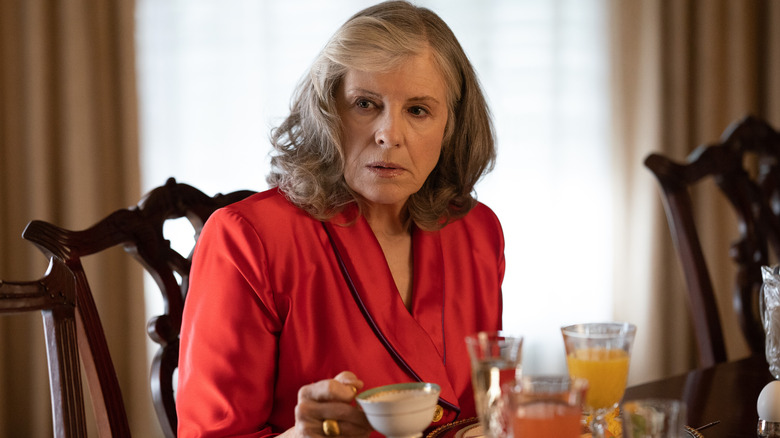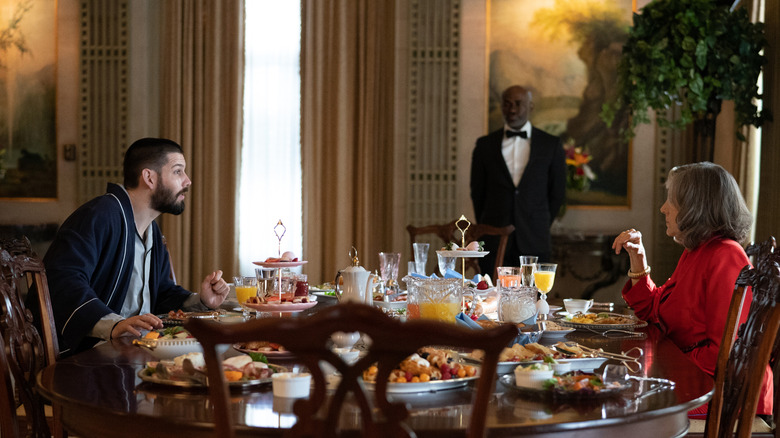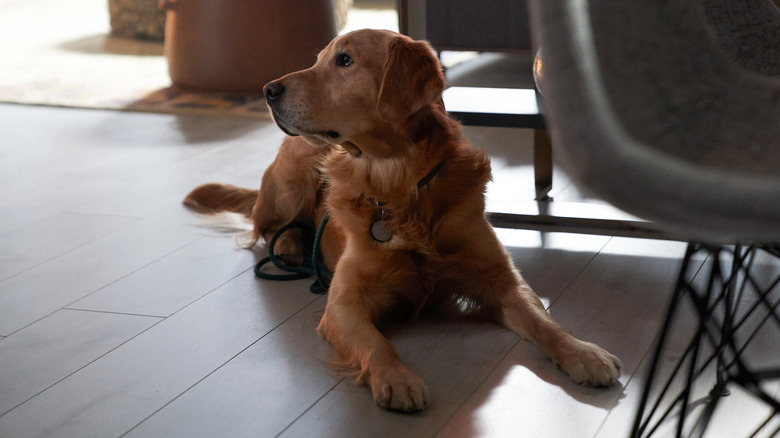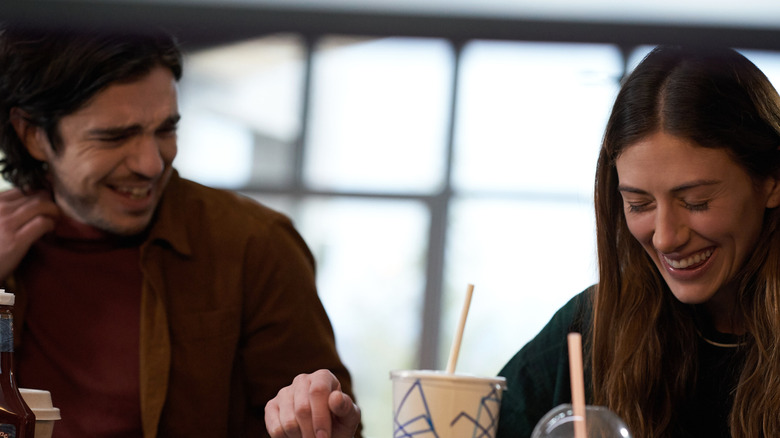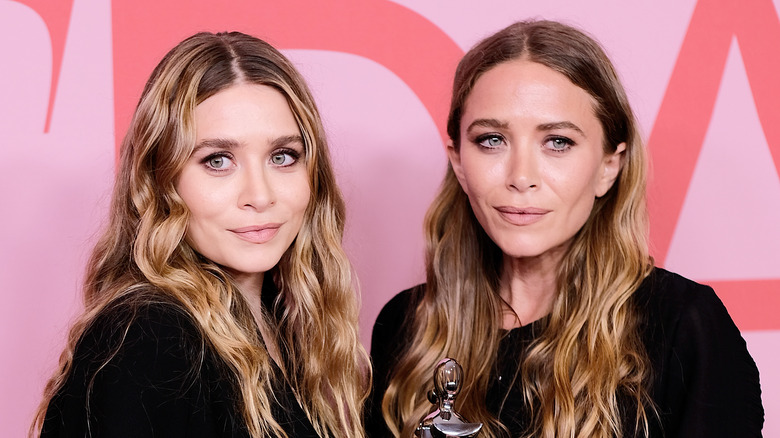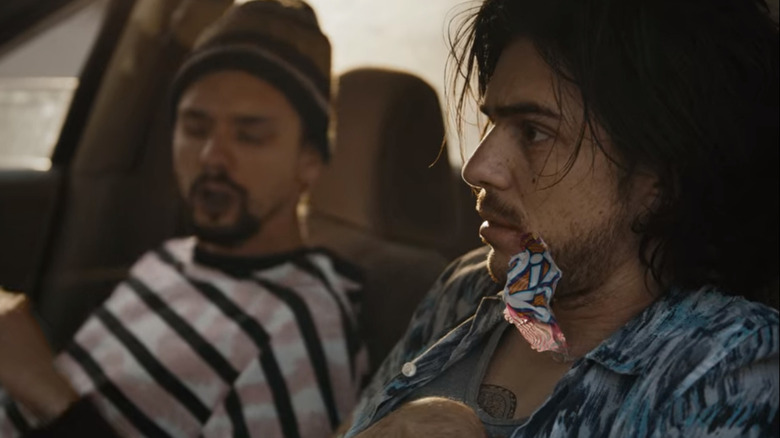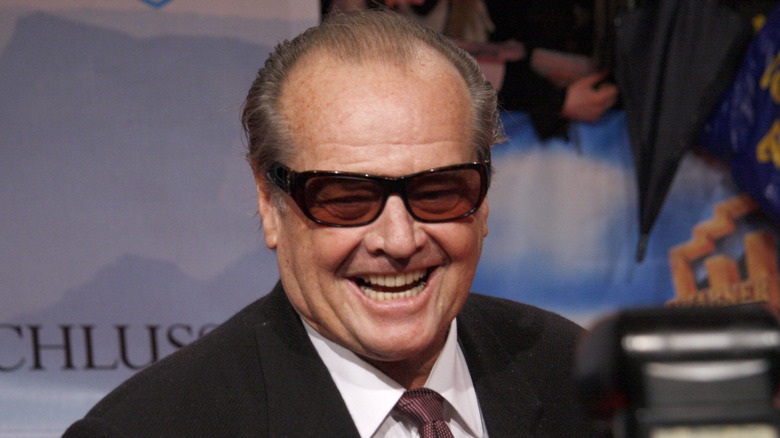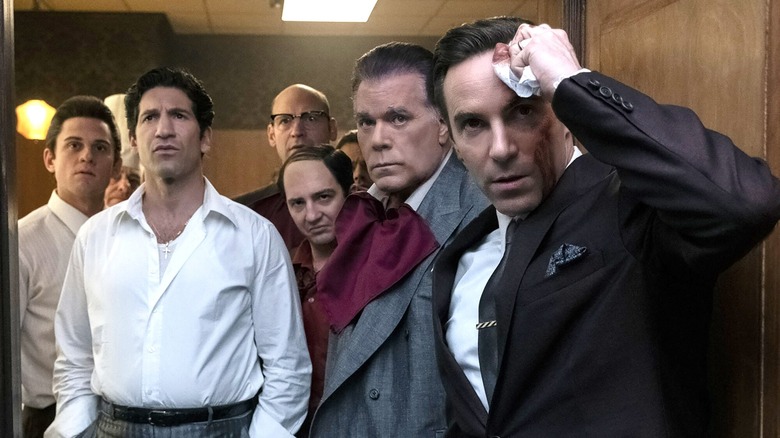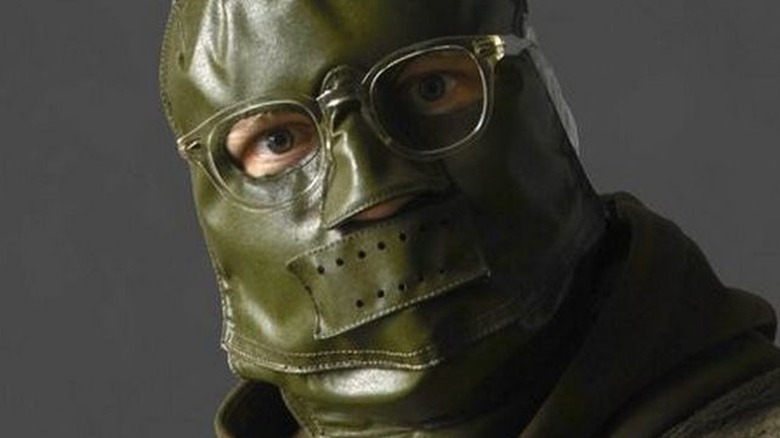In The Dark's Morgan Krantz On Directing Perry Mattfeld, Saying Goodbye, And Representation - Exclusive Interview
This article contains spoilers for Season 4 of "In the Dark."
Before The CW's Perry Mattfeld-led series "In the Dark" takes its final bow, actor Morgan Krantz (Felix Bell) took on a directorial role in the series' penultimate episode, "C.I. Was Right." In addition to his directing credits, Krantz has an acting résumé a mile long. He's had roles in popular shows like "New Girl," "Switched at Birth," "Better Call Saul," and "2 Broke Girls." He also wrote and directed the 2015 film "Babysitter" along with starring in movies like "Tone-Deaf" and "Everything Is Free." Now, he's saying goodbye to Felix, the character he's played for four years alongside co-stars who became pseudo-family.
During an exclusive interview with Looper, Krantz dished on his "In the Dark" directorial debut, coaxing out Mattfeld's flirty side during a comedic scene, and bonding with Casey Deidrick. He also discussed Brooke Markham's departure from the show, teased the show's ending, and mused on whether or not Mattfeld's character Murphy Mason and Felix could ever be together. He even went down filming memory lane to his first project with Mary-Kate and Ashley Olsen, and he shared his experience working with Bob Odenkirk on "Better Call Saul."
The director dynamic
You took on a directorial role in "C.I. Was Right," but you're also heavily featured. What was it like stepping up as the director and juggling acting duties alongside the directing duties?
It's an interesting balance. It's a lot about the foresight and the preparation with both things, but mainly, you want to prepare extra hard with the directing so that you ideally don't have to think too much about those problems and you can focus on the acting when that comes up. But it is a very different vantage point to watch a scene from outside of a scene and to watch a scene from inside of a scene. In that way, it's beneficial, because as a director, you can feel things more viscerally than if you were just watching it, which can be helpful.
Did you step right into the new dynamic with the cast, or did it take some adjusting to get used to?
I was nervous about if the actors would ... I'm very close with all of them, but it is a different vibe. I was a little nervous that maybe they would laugh at me, but everybody was immediately super supportive and welcoming. Honestly, it was one of the most rewarding parts of directing to work with them in that way.
For me to direct an actor ... because I come from mostly indie stuff, the only way I know how to direct is very intimately. The fact that I knew who they were as people, I knew their stories, and I'd seen them in situations, I knew what they were capable of — they immediately liked that because they could see that I was asking maybe more of them than a stranger would because I know what their sense of humor is. I know what their problems are. I was cheating a little bit. But no, everybody was incredible. It was a great part of the process.
Coaxing out Perry Mattfeld's flirty side
Can you pick out anything in particular that you tweaked or adjusted or gave notes on or anything?
There's this thing I did with Perry [Mattfeld] where I asked her to play a scene — it's that scene where she's flirting with that guy outside the garage. I have seen Perry in all sorts of situations over the years. I knew that Perry had this alter ego person in her, that a lot of girls sometimes have — and probably guys too — which would turn on. It's a little bit of a persona that's like, "Oh, my God. Yeah, totally." You're basically acting in this flirty way.
Anyway, I felt like I kept saying to her ... I joke that she's from Redondo Beach even though she's not. But I was like, "I want that USC frat girl," because there's a part of her that has this cheerleader frat girl. She can turn it on. I've seen her at parties and stuff. If she wants to be polite to get out of a conversation, I've seen her do it.
I made her do that in the scene, this — for lack of a better term — "basic B" thing. It was so great. It reminded me of Bugs Bunny, when Bugs Bunny puts on lipstick and acts all flirty. It was awesome because all the audiences know Murphy so well. It was fun to see that. We even got a little scared at some point; we're like, "Should we do one without that?" I was like, "No, I'm in charge, so no."
That was fun. I really liked that moment. Obviously, Perry is comedically a genius actress if she's allowed to be [or] if she's asked to be. She's so funny as a person, too. I was really happy with that moment.
Then, Casey Deidrick and I had ... He made me cry in that scene in the library. He actually made me cry because there was a whole meta layer to that scene where I feel like [he] and I were connecting in a way as Morgan and Casey. We had never connected in a way that we were connecting, suddenly, because I was his director. It was both what Felix and Max were experiencing, and it's like, "Oh, look. Wow. We're really connecting." [He] and I were actually experiencing the same thing. It was a perfect storm of real life and character storyline in that right sweet spot. He did incredible work there.
Getting closure amid cancelation
Sadly, this is the last season of the show. How did you hear about that news, and what was your initial reaction to it?
I heard it over the phone. Actually, no — I had missed a call from [creator and producer] Corinne Kingsbury, and then I saw it on the news. I was like, "Oh, that must be what the call is about." It's sad because we could have probably kept telling the story, and I became very close with not only the people on the show but a lot of people I met in Toronto — very close friends of mine. It's sad, but I'm glad to quit before it gets stale or something. It's cool to leave them wanting more.
Do you know if the writers had enough time to write an ending with closure, or should we expect the usual cliffhangers at the end of the series?
No, they were prepared for that. They were prepared for the scenario, so I think they covered ... I know the ending, and there is a nice bit of closure. But I don't think we were sideswiped by it necessarily.
This is the first season without Brooke Markham's character, Jess. What has it been like doing the show without her, and how do you feel about her ending in Season 3?
I thought her ending was powerful, and she's ... Honestly, I always knew she was a great actress, but when I was preparing to direct, I re-watched some of the episodes that I felt had the strongest vision from prior seasons. Rewatching some of her work, she's so good. She's a great actress.
Doing it without her definitely was different. It was a different vibe. The dynamics were a little different, but I thought she had a strong ending. That character, at a certain point, deserved to be like, "Okay, I've had enough," because people can only take so much of people like Murphy. It was a positive ending for a character, and a realistic one, that somebody should finally say, "You know what? I got to get you out of my life now."
Is that definitely it for her, or is there a chance we might see her in the finale?
You never know.
That was the answer I was expecting, but I had to ask anyway.
For sure.
Addicted to the drama
The show has been addressing how selfish Murphy is in the past two seasons, but after everything that she's put Felix through, he's still staunchly supportive. What is it that keeps Felix from doing the same thing that Jess did? Do you ever get frustrated with him for not setting fiercer boundaries?
Definitely. I actually think it's harder for him to see her clearly in the way that Jess finally does and other people do. Part of that is because she's a beautiful woman; not that he's in love with her necessarily, but he can't help but sympathize with her situation.
The other thing is that he's a little addicted to her. She's addicted to these crazy dramas that they whip up, basically — and he, on some level, is addicted to her. She's the most exciting person, and Felix grew up in a very square environment. She's so full of life and danger and all these things, like a flame that he can't take his eyes off of. He knows it's dangerous, and he knows it's bad news, but [he] can't help but love her and let her in.
From riches to crime syndicates
We're finally getting a deeper look at Felix's backstory and family life. What have been the most exciting aspects of diving into that history and having Felix in a place where his circumstances have sucked him back into this world that he never really wanted to be a part of?
It's funny because when we first did the pilot, I don't think even the writers knew that Felix came from this background. I thought he was a blue-collar guy, good samaritan or something — works in a non-profit. But as it develops, it all starts to make sense. One of the most exciting parts of it was to understand that Felix does have these morals, on some level, because the show does revolve around a lot of moral questions.
[You] see that he does have this allergic moral thing against his Waspy rich family, but then you realize that it's not so much about principles for him, it's about the fact that they never accepted him. He hates them. If they had said, "Oh, you're our golden boy," he probably would've ... If he'd had [a] better childhood, he'd probably be one of those people. He was never let in there.
It's interesting that then he becomes part of Murphy's world as a way of sticking it to them. Murphy's world is, in many ways, way more morally corrupt. But in a way, it's still more honest, somehow. It's more directly dealing with crime as opposed to this sort of evil office banality of global evil ... Mavis, played by Mimi Kennedy, she's a real G and brought a lot to the whole lore of his family. She was amazing to work with.
Fighting toxic masculinity
Felix's grandma's quote of "Boys will be boys" was fascinating when she learns that Max cheated on her granddaughter. Felix is horrified by that toxic masculinity, and he is well known for not adhering to those types of hyper-masculine traits that so many men are pushed into. Why do you think these are such important topics to combat in media? What do you think made Felix willing to be vulnerable and sensitive, no matter how many times people roast him for it?
I find this to be true of people who grew up in cultures where there was a lot of that energy, people who grew up dealing with racism, sexism, all these things. They either ... Felix, from a young age, was surrounded by this kind of Wall Street bro energy, even with the women in his family. He really is allergic to that and never wants to allow himself to be those types of guys because those types of guys made his life very difficult early on.
The show's core got a little shaken up this season with Murphy toggling between prison, the house arrest, and the focus on her trial rather than some of those heavy action sequences we've had in past seasons. What has that transition been like to have a stable place where you're working out of Felix's sister's house and these new plot lines?
It still felt pretty [much] like we were spanning a lot of geography and locations. For Felix, in the first couple seasons, it was all about Guiding Hope. I was always at Guiding Hope, and then it became I was always at Leslie's cabin. They actually built Leslie's cabin on the same stage that Guiding Hope had been built. They tore that down and built Leslie's cabin. I don't know. I guess they're less transient, but they're all still so unmoored in their lives, so it didn't necessarily feel like stasis or anything.
Pretzel: TV's best pup
Everyone loves Murphy's seeing-eye dog, Pretzel. Do you have any fun stories from set with everyone's favorite pup?
Anytime he burps or farts is a hilarious moment. Sometimes that happens in the middle of a take. Even though he's a consummate professional, he's still a dog. I don't know. The big thing with Pretzel is that you want to touch him and cuddle, you want to play with him, but he's also a trained professional dog — but also a dog. It's a hard line to walk because I want to roughhouse with him, but then sometimes it would be very inappropriate for me to do that, because the trainer, Vi, would be like, "You're screwing it all up, man. He's got to be sitting down in the scene," and I'd totally screw it up because I'm excited to play with him.
I could never see a dog and not engage.
Yeah, it's hard.
I was laughing during the scene in the pet shop because I was noticing the dog was very interested in some of the [food and toys] in the store rather than Jess, and that made me laugh.
[He's a] great actor — makes very interesting choices, always.
Felix and Murphy: The endgame that will never be
It's obvious that Felix wants to end up with Murphy in a lot of the things that have happened this season, even though he knows that it's a bad idea that will only end up in flames. Do you want to see them end up together, or are you hoping that Felix moves on? What do you think keeps Felix holding out hope after being spurned so many times?
God, who knows? If he really got her, if Murphy was like, "Listen, Felix, I want to be with you. I'm ready," would he still want to, or is it the chase that he's after? On some level, isn't the dynamic that he'll never have her [a] part of what makes their dynamic work?
I can't even imagine what would happen if she was in love with him or something. I'm sure he would give it a go, but it would be very interesting. I would be interested if there was a fifth season; I would love to see what would happen there. I have no idea, because it feels like that would be a total world reversal.
Definitely. I feel like it would last five minutes ...
Five minutes, max.
Then both of them would be like, "This isn't working."
Somebody would screw it up. He's pretty neurotic too, so one of them would screw it up quick — probably Murphy.
On-screen rejections still hurt when you're nine
Switching gears a little bit, your first role was working on a Mary-Kate and Ashley short in 1995. What was that experience like?
My stepdad at the time was directing that. I happened to be on the cruise, and he gave me $50 cash to do it. If you watch it — you can find the clip on YouTube — you [can] see that I was born with no natural talents. If I have any talent now, I worked very hard to attain it because I was looking at the camera the whole time. I had one line, and I'm nine years old, and I'm staring at the camera as if it's a monster that's coming toward me. I managed to get my line out.
I remember the Olsen twins were such good actresses. I had a big crush on them because we were the same age, and why not? They're supposed to react in the scene very disgusted by me and like, "Oh, you're a loser." When they gave me that reaction in the scene, I thought it was real. Maybe it was. I was crestfallen. I was devastated because I was like, "Oh my God, they hate me." But then there was "Cut," and they were like, "Nice to meet you." I was like, "Wow, they're really pros."
Did you know that was supposed to be their reaction before it happened, or was that in the moment?
I was nine years old, and I probably wasn't the brightest nine-year-old, so I don't think I totally understood. My mother was an actress too. I don't think I totally understood the blurring of the fiction and the reality yet. It was confusing to me, and I felt like it was my first rejection.
An outsider's perspective
You were also on "Switched at Birth," and that show has significant deaf representation. What draws you to shows like "In the Dark" and "Switched at Birth," and why do you think it's so important for media to represent different voices and lived experiences?
That's the beauty of art, period — it gives you a window into other characters and their lives and stuff. There's no reason that that shouldn't be extended to those communities. I always feel [like] an outsider in any situation, basically. Maybe it's that I feel most normal amongst a story about people who also feel like outsiders, for some reason.
You also had a three-episode stint on "Better Call Saul." What was that experience like, and what were some highlights of working with Bob Odenkirk and the rest of the cast?
Oh man, that was awesome. The great thing about that character was it was totally opposite from Felix, in that he was ... Felix is a very thoughtful, cerebral guy. This guy, Ron, was completely like a dog unleashed from hell. He was all Id: pure impulse, no intelligence to get in the way of impulse at all. It was fun to do that after doing Felix for a season or two at that time. It was a real different thing.
Working with Bob Odenkirk, it was amazing to watch him find a scene. We did a scene together where he showed up, and it was not quite taking off. We could all feel it, but it wasn't my place to say anything. He stopped it, and he was like, "Let's talk about this." I was the scene partner in it, so we both got into it, like, "Oh, what if we do this? What if we do that?" It was so open and bubbly and creative, on the spot. He made it so effortless, and he's a nice guy.
It was amazing to be a part of that world. I was into "Breaking Bad" and that show, so it felt like my version of entering the MCU. It really is its own universe. They have movies, and I'm sure they have action figures. It's really its own world if you're in it. To be a character in this comic book world, almost, it was an honor. It was awesome.
A dream co-star list
You've been in a significant number of projects. Is there anyone that you've worked with in the past that you would've liked to see appear on "In the Dark"?
God, I don't know. Seeing as how the show is canceled, I feel like it'll only make me sad to fantasize about that, so [I'm gonna] pass.
That's fair. Is there a dream actor or director from any time that you would like to work with?
Yeah, there's a lot. I don't know if I should go alive or dead with this one ...
You can go both if you want.
My favorite actors are Jack Nicholson and Dustin Hoffman from the '70s. They're still around. I would do anything. I would scrub their toes in the scene — whatever it takes — because it would be nice to meet them while I can. I'm quite into them. Jack Nicholson did some interesting directing, but I do like guys who are actor-directors. I'm very drawn to a lot of that work, like Albert Brooks and ... Well, there's a lot.
Too many movies to choose
Do you have a favorite movie or TV show of all time?
[For] a TV show, I'm going to have to say "The Sopranos" — really good for me. [A] favorite movie is hard because I'm a big movie buff. I don't know how to narrow it down to just one.
How about a favorite movie when you were a kid and a favorite movie now?
My favorite movie growing up was this weird movie [from] when I was like 11 called "The Doom Generation," which is a weird, cool ... When you're 11 years old, you're like, "This is so cool."
Now ... let me look at my Letterboxd; let me see what I've watched recently that I went crazy for. I'm into obscure stuff, so I don't want to sound pretentious or anything and say something that people are like, "Really?" But the truth is, I really do enjoy some of these things ... I'm trying to look for a good movie that I liked recently. One of my favorite movies — oh, you know what? One of my favorite directors ever is Billy Wilder.
You could add that to the previous question. God, I don't know. How about I tell you the last three movies I've marked with five stars, which is very rare for me?
Perfect.
Okay. I just rewatched "Nashville." I gave that [five stars]. Then I just watched this movie called "Paris Blues," which I gave my highest rating. The other one was a movie called "Rancho Deluxe," which I gave my highest rating. I hope somebody seeks out those films. They're pretty damn good.
Riddle me this
Is there a dream role, whether it's been done before or not, that you would love to take on?
I want to play criminals, and I would like to play a rock star. I want to play a musician. I would love to do the rise and fall of a rock star thing, and any form of criminal — "Better Call Saul" was a good ... But he was super dumb. Felix is a criminal in a way, too, technically. But I want to play a real, Ratso from "Midnight Cowboy" criminal — a scummy criminal.
Is there a comic book villain that you would like to play?
Oh, damn. It's been a while since I've been into comic books. But one of my first jobs was actually a writer's assistant for a comic book writer. God, what are some good [comic book villains]? I don't know ... I was definitely jealous of Jesse Eisenberg doing Lex Luthor. I was like, "That'd be a good one." I would like to do that one because I like his coldness. I don't know enough about the villains to choose one. Do you know them? What would you say for that?
Do you want to be cunning? The Riddler. I could see you as a good Riddler.
Oh, yeah. Riddler would be awesome. Joker is almost too ... It's a little overexposed. It's been in such good hands so many times that it's like, "Why? Why would anybody ...?" I don't think anybody needs to touch that for another decade, probably, other than Joaquin Phoenix, because Heath Ledger was amazing, and Jack Nicholson was amazing. But Riddler, I like that. That would be amazing, actually. Wait — isn't somebody doing that now, though? Isn't Paul Dano doing that?
Yeah, but it's comics.
[Joking] All right. Well, he needs to get out of the way. I'm coming in. That would be fun.
You could even do an animated version, too.
I would like to do that. That would be fun. I like him.
Before I let you go, do you have anything else you want to plug?
Not at the moment. If you like my episode of the show, you can check out the short film ["Squeegee"] I made before that — it's linked in my bio on Instagram.
New episodes of "In the Dark" air Mondays on The CW, with episodes streaming on the CW website and app the next day.
This interview was edited for clarity.
